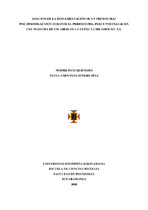| dc.contributor.advisor | Agudelo Vélez, Diana María | |
| dc.contributor.author | Pico Quintero, Nindre | |
| dc.contributor.author | Rivero Díaz, Paula Fernanda | |
| dc.coverage.spatial | Seccional Bucaramanga. Universidad Pontificia Bolivariana. Escuela de Ciencias Sociales. Facultad de Psicología | spa |
| dc.coverage.temporal | 2008 | |
| dc.date.accessioned | 2013-06-17T19:56:06Z | |
| dc.date.available | 2013-06-17T19:56:06Z | |
| dc.date.created | 2008-05-29 | |
| dc.date.issued | 2013-06-17 | |
| dc.identifier.uri | http://hdl.handle.net/20.500.11912/157 | |
| dc.description | 168p.: (pdf); il; gráficas; tablas; anexos | spa |
| dc.description.abstract | Desde el punto de vista psicológico, la gestación es el inicio de lo que se puede entender como proceso de maternización que implica la posibilidad de adquirir cualidades de madre, no relativas no solo al hecho biológico, sino también al desarrollo psicológico y emocional. Con esta investigación se pretendió evaluar el efecto de la implementación de un protocolo psicoprofiláctico durante el periodo pre, peri y postnatal en 35 mujeres pertenecientes al grupo experimental y 35 mujeres pertenecientes al grupo control, a quienes se les aplicó una batería de instrumentos orientada a la identificación de los niveles de ansiedad, las estrategias de afrontamiento y la valoración subjetiva del dolor. Se trata de un estudio tipo longitudinal. Dentro de los resultados más relevantes se encontró que: 1) las gestantes pertenecientes al grupo experimental disminuyeron sus niveles de ansiedad después de la aplicación del protocolo psicoprofiláctico 2) las gestantes pertenecientes al grupo control experimentaron mayor ansiedad 3) la estrategia de afrontamiento más utilizada en el grupo experimental pretest es religión (74.3%) y la estrategia de afrontamiento que prevalece en el grupo experimental post test es el apoyo profesional (97.1%) 4) la estrategia de afrontamiento más utilizada en el grupo control es religión (77.1%) 5) el nivel de dolor antes del parto es severo (60%), el nivel de dolor durante el parto fue valorado como moderado (83%) y el nivel de dolor después del parto también fue valorado como moderado encontrando diferencias en la prevalencia (63%) 6) la valoración del dolor para las mujeres del grupo experimental fue moderada, mientras que las mujeres pertenecientes al grupo control catalogaron el dolor como severo (54%). De acuerdo con los hallazgos de la investigación es posible afirmar que existe un importante grado de impacto en las gestantes que participaron en la implementación del protocolo psicoprofiláctico. | spa |
| dc.description.abstract | From the psychological view point, the gestation is the start of what it may be
understand like maternityzation process that implicates the possibility of to
acquire qualities of mother, not only relative to the biological event, but to the
psychological and emotional development. With this research was pretended to
evaluate the effect of the implementation of a psychoprophylactic protocol
during the pre, peri and post natal cycle, in thirtyfive
women pertaining to the
experimental group and thirtyfive
women pertaining to the control group, to
whom were applied them a battery of instruments directed towards the
identification of the anxiety levels, the confrontations strategies and the
subjective valuation of the pain. Is a matter of a study of longitudinal type Inside
of the most relevant results was found that: 1) the expectant mothers to belong
to the experimental group decreased themselves their levels of anxiety after the
application of the psychoprophylactic protocol 2) the expectant mothers to
belong to control group experienced themselves major anxiety 3) the
confrontations strategy most used of the experimental pretest group religion
(74.3%) and the confrontations strategy that prevail of the experimental post
test group is the professional support (97.1%) 4) the confrontations strategy
most used of the control group is religion (77.1%) 5) the level of pain before the
childbirth is severe (60%), the level of pain during the childbirth was valued like
moderate (83%) and the level of pain after childbirth also was valued like
moderated finding differences in the prevalence (63%) 6) the valuation of pain
for the women of the experimental group was moderated, while the women
pertaining to the control group catalogued the pain like severe (54%). In accord
with the discoveries of the research it’s possible grade of impact in the
expectant mothers that participated in the implementation of the
psychoprophylactic protocol. | |
| dc.language.iso | es | |
| dc.rights | Attribution-NonCommercial-NoDerivatives 4.0 International | * |
| dc.rights.uri | http://creativecommons.org/licenses/by-nc-nd/4.0/ | * |
| dc.subject | Psicología | |
| dc.subject | Tesis y disertaciones académicas | |
| dc.subject | Trabajos de grado psicología | |
| dc.subject | Embarazo - aspectos psicológicos | spa |
| dc.subject | Embarazo - aspectos emocionales | spa |
| dc.subject | Protocolo psicoprofilactico | spa |
| dc.title | Efectos de la implementación de un protocolo psicoprofiláctico durante el período pre, peri y postnatal en una muestra de usuarias de la Clínica Chicamocha S.A | spa |
| dc.type | bacherlorThesis | spa |
| dc.rights.accessRights | openAccess | spa |
| dc.type.hasVersion | publishedVersion | spa |
| dc.identifier.instname | instname:Universidad Pontificia Bolivariana | spa |
| dc.identifier.reponame | reponame:Repositorio Institucional de la Universidad Pontificia Bolivariana | spa |
| dc.identifier.repourl | repourl:https://repository.unab.edu.co/ | |


